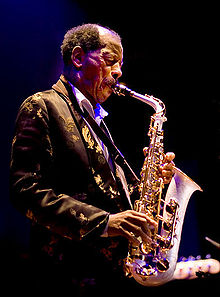
Back Ornette Coleman ALS Ornette Coleman AN اورنيت كوليمان ARZ اورنت کلمن AZB Орнет Колман Bulgarian Ornette Coleman BS Ornette Coleman Catalan Ornette Coleman Czech Ornette Coleman Danish Ornette Coleman German
Ornette Coleman | |
|---|---|
 Coleman at the Enjoy Jazz Festival in Heidelberg, 2008 | |
| Background information | |
| Birth name | Randolph Denard Ornette Coleman |
| Born | March 9, 1930 Fort Worth, Texas, U.S. |
| Died | June 11, 2015 (aged 85) Manhattan, New York City, U.S. |
| Genres | |
| Occupation(s) |
|
| Instrument(s) | |
| Years active | 1940s–2015 |
| Labels | |
Randolph Denard Ornette Coleman (March 9, 1930 – June 11, 2015)[1] was an American jazz saxophonist, trumpeter, violinist, and composer. He is best known as a principal founder of the free jazz genre, a term derived from his 1960 album Free Jazz: A Collective Improvisation. His pioneering works often abandoned the harmony-based composition, tonality, chord changes, and fixed rhythm found in earlier jazz idioms.[2] Instead, Coleman emphasized an experimental approach to improvisation rooted in ensemble playing and blues phrasing.[3] Thom Jurek of AllMusic called him "one of the most beloved and polarizing figures in jazz history," noting that while "now celebrated as a fearless innovator and a genius, he was initially regarded by peers and critics as rebellious, disruptive, and even a fraud."[3]
Born and raised in Fort Worth, Texas, Coleman taught himself to play the saxophone when he was a teenager.[1] He began his musical career playing in local R&B and bebop groups, and eventually formed his own group in Los Angeles featuring members such as Ed Blackwell, Don Cherry, Charlie Haden, and Billy Higgins. In November 1959, his quartet began a controversial residency at the Five Spot jazz club in New York City and he released the influential album The Shape of Jazz to Come, his debut LP on Atlantic Records. Coleman's subsequent Atlantic releases in the early 1960s would profoundly influence the direction of jazz in that decade, and his compositions "Lonely Woman" and "Broadway Blues" became genre standards that are cited as important early works in free jazz.[4]
In the mid 1960s, Coleman left Atlantic for labels such as Blue Note and Columbia Records, and began performing with his young son Denardo Coleman on drums. He explored symphonic compositions with his 1972 album Skies of America, featuring the London Symphony Orchestra. In the mid-1970s, he formed the group Prime Time and explored electric jazz-funk and his concept of harmolodic music.[3] In 1995, Coleman and his son Denardo founded the Harmolodic record label. His 2006 album Sound Grammar received the Pulitzer Prize for Music, making Coleman the second jazz musician ever to receive the honor.[5]
- ^ a b Ratliff, Ben (June 11, 2015). "Ornette Coleman, Saxophonist Who Rewrote the Language of Jazz, Dies at 85". The New York Times. Retrieved December 16, 2018.
- ^ Mandell, Howard. "Ornette Coleman, Jazz Iconoclast, Dies At 85". NPR Music. Retrieved January 12, 2023.
- ^ a b c Cite error: The named reference
allmusicbiowas invoked but never defined (see the help page). - ^ Hellmer, Jeffrey; Lawn, Richard (May 3, 2005). Jazz Theory and Practice: For Performers, Arrangers and Composers. Alfred Music. pp. 234–. ISBN 978-1-4574-1068-0. Retrieved December 15, 2018.
- ^ "2007 Pulitzer Prizes". Pulitzer.org. Retrieved July 13, 2020.
© MMXXIII Rich X Search. We shall prevail. All rights reserved. Rich X Search